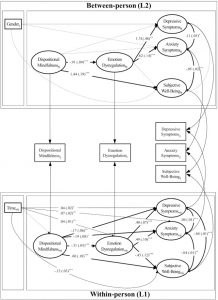Mindfulness is Associated with Better Mental Health in Young Adults
By John M. de Castro, Ph.D.
“Mindfulness is recommended as a treatment for people with mental ill-health as well as those who want to improve their mental health and wellbeing.” – Mental Health Foundation
Mindfulness stresses present moment awareness, minimizing focus on past memories and future planning. Depression is characterized by a focus on the past while anxiety is characterized by focus on the future. Although awareness of the past and future are important, focus on the present moment generally leads to greater psychological health and well-being. Mindfulness appears to improve the individual’s ability to regulate emotions. It is reasonable to assume that this improvement in emotion regulation may be responsible for the beneficial effects of mindfulness on mental health. There is a need to better understand how mindfulness and emotion regulation produce these benefits.
In today’s Research News article “Dispositional mindfulness and mental health in Chinese emerging adults: A multilevel model with emotion dysregulation as a mediator.” (See summary below or view the full text of the study at: https://www.ncbi.nlm.nih.gov/pmc/articles/PMC7676716/ ) Cheung and colleagues recruited from a university healthy young adults aged 18 to 29 years. They completed measures at baseline and 3 and 6 months later of mindfulness, emotion regulation, depression, anxiety, and well-being. These data were then subjected to regression analysis and multilevel mediation analysis.
They found that at all time points the higher the levels of mindfulness the lower the levels of depression, and anxiety, and the higher the levels of emotion regulation, and subjective well-being. They also found that the higher the levels of emotion regulation the lower the levels of depression, and anxiety, and the higher the levels of subjective well-being.
The mediation analysis suggested that mindfulness was associated with improved anxiety, depression, and well-being directly and also indirectly through emotion regulation, such that high mindfulness was associated with high emotion regulation which was, in turn, associated with lower anxiety and depression and higher well-being. Over the 3 measurements mental health of the participants appeared to decrease with higher levels of anxiety and depression and lower levels of well-being, perhaps as the stress of the academic year increased. But the relationships of these variables with mindfulness and emotion regulation remained intact over the 3 time periods.
These results are correlational and as such conclusions regarding causation cannot be made. But previous research has shown causal connections between mindfulness and emotion regulation, depression, anxiety, and well-being. So, the present results likely also reflect causal influences of mindfulness. The results suggest that mindfulness has direct beneficial effects on mental health and also indirect effects by improving the regulation of emotions. Emotion regulation involves the ability to fully experience emotions but also being able to control response to the emotions. This appears to be strengthened by mindfulness and is an important route by which mindfulness produces better mental health.
So, mindfulness is associated with better mental health in young adults.
“Young adulthood is an incredibly important time marked by major changes, big life decisions and new pressures. Without proper support and the right skills in place, many young adults can suffer from depression and feelings of anxiety that can manifest as avoidance, substance use and self-harm. Mindfulness techniques help clients attend to their thoughts and feelings non-judgmentally and moment-to-moment. This helps them connect with their inner selves, engage more fully in their present life activities and develop better coping mechanisms for life’s stressors.” – The Dorm
CMCS – Center for Mindfulness and Contemplative Studies
This and other Contemplative Studies posts are also available on Google+ https://plus.google.com/106784388191201299496/posts and on Twitter @MindfulResearch
Study Summary
Cheung, R., Ke, Z., & Ng, M. (2020). Dispositional mindfulness and mental health in Chinese emerging adults: A multilevel model with emotion dysregulation as a mediator. PloS one, 15(11), e0239575. https://doi.org/10.1371/journal.pone.0239575
Abstract
Using a multilevel model, this study examined emotion dysregulation as a mediator between dispositional mindfulness and mental health among Chinese emerging adults. Participants were 191 Chinese emerging adults (female = 172) between 18 and 27 years old (M = 21.06 years, SD = 2.01 years), who completed a questionnaire that assessed their dispositional mindfulness, emotion dysregulation, and mental health outcomes for three times over 12 months, with a three-month lag between each time point. Within-person analysis revealed that emotion dysregulation mediated between dispositional mindfulness and mental health outcomes, including subjective well-being and symptoms of depression and anxiety. Time was positively associated with emotion dysregulation and negatively associated with symptoms of depression and anxiety. Between-person analysis revealed that emotion dysregulation negatively mediated between dispositional mindfulness and symptoms of depression and anxiety, but not subjective well-being. These findings call attention to within-person versus between-person effects of emotion dysregulation as a mediator between dispositional mindfulness and psychological outcomes, particularly of symptoms of depression and anxiety. Attesting to the relations established in western societies, the relations are also applicable to emerging adults in the Chinese context. Evidence was thus advanced to inform translational research efforts that promote mindfulness and emotion regulation as assets of mental health.
